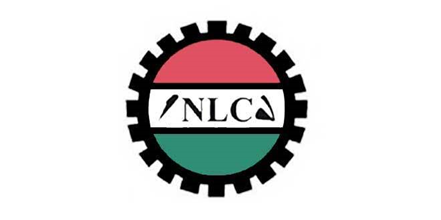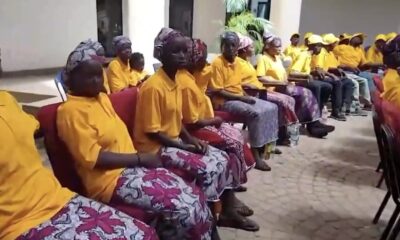Business
NLC counters Shettima, says Dangote not above law

The Nigeria Labour Congress on Tuesday criticised Vice President Kashim Shettima for describing the Dangote Group as a “national asset”, saying no company, regardless of size or influence, is above the country’s labour laws.
In a statement issued on World Decent Work Day, NLC President Joe Ajaero described Shettima’s remarks as a national tragedy and warned that they could signal that wealth and political clout override legal protections for workers, potentially undermining labour rights in Africa’s largest economy.
Ajaero accused the Dangote Group of infringing on workers’ rights to freedom of association, including the right to join trade unions of their choice, as enshrined in the Nigerian Constitution, the Labour Act, the Trade Union Act, and core International Labour Organisation conventions.
He said the Petroleum and Natural Gas Senior Staff Association of Nigeria was fulfilling its mandate to protect members from exploitation and criticised attempts to portray union activity as sabotage or a threat to national interests.
“We state unequivocally to Vice President Shettima: No company, no matter how big, ‘strategic’, or well-connected, can operate outside the law or be bigger than Nigeria. If the Dangote Refinery is to be granted rights and privileges above the law, then the government must be prepared for the storms such injustice will inevitably unleash. There can be no peace without justice,” Ajaero declared.
His comments followed the dismissal of roughly 800 workers at the $20 bn Dangote Refinery after they joined PENGASSAN. Shettima publicly condemned the industrial action as a minor labour dispute that should not hold Nigeria to ransom, emphasising the refinery’s critical role in the economy.
He praised billionaire industrialist, Aliko Dangote for his investment in Nigeria and called for industrial harmony to maintain investor confidence. Federal Government intervention led to a conciliatory agreement under which the dismissed workers were reinstated, the strike suspended, and operations restored.
Ajaero criticised the government for failing to protect workers, arguing that siding with powerful corporations amounted to endorsing lawlessness. He described the situation as a declaration of class war, with the state aligning with the powerful against the vulnerable, and warned that tolerance for corporate impunity threatens the welfare and security of Nigerian citizens.
The NLC also highlighted similar labour disputes, including those involving contractors at the NLNG Train 7 project in Bonny, Rivers State, who allegedly dismissed thousands of workers and replaced them with foreign labour after disagreements over lawful tax remittances.
Ajaero said such actions illustrate the broader dangers of encouraging lawlessness and warned the government against shielding companies from accountability.
He added that no company could operate above the law and that granting special privileges to corporations like Dangote would provoke unrest. The NLC demanded that all entities operating in Nigeria comply with industrial relations laws, recognise trade unions, and respect workers’ rights.
Ajaero also called for stronger enforcement mechanisms to ensure compliance, insisting that human capital, not corporations, is the nation’s true asset.
“The serial violations of the ideals of decent work are a ticking time bomb,” Ajaero said. “We will mobilise, we will organise, and we will fight back. There are no sacred cows.”
The dispute comes amid broader challenges facing Nigerian workers. The national minimum wage, raised to N70,000 in July 2024, has struggled to keep pace with inflation and rising living costs. Several states, including Lagos, Imo, Rivers, Bayelsa, and Niger, have independently raised wages beyond the federal level, highlighting disparities in workers’ earnings.(Punch)
-

 News7 hours ago
News7 hours ago‘They beat men, flogged children’ — Freed Kaduna worshippers recount ordeal in bandits’ captivity
-

 News18 hours ago
News18 hours agoLagos announces six-week traffic diversion for Apongbon Bridge repairs
-

 Metro19 hours ago
Metro19 hours agoMakoko’s ₦400/Month ‘Rent’ Goes Viral: A Stark Glimpse into the ‘Almajirization’ of Lagos
-

 World News15 hours ago
World News15 hours agoEpstein files rife with uncensored nudes and victims’ names, despite redaction efforts
-

 News20 hours ago
News20 hours agoKwara massacre: Tinubu deploys army battalion to Kaiama LG
-

 News10 hours ago
News10 hours agoFormer NEXIM MD Bags 490-Year Jail Term
-

 News7 hours ago
News7 hours agoN219bn federal projects in 2024 budget not executed despite funds released – Tracka
-

 Metro6 hours ago
Metro6 hours agoHow I ended up with a philanderer, gay man, before marrying Reuben Abati – Kikelomo Atanda-Owo


















